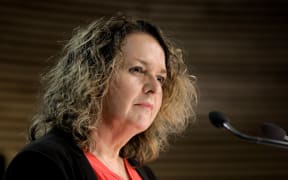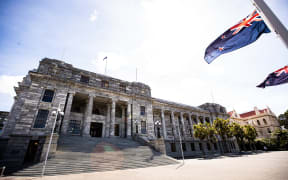
The changes will enhance Wānanga rangatiratanga, Associate Minister of Education Kelvin Davis says. Photo: RNZ / Samuel Rillstone
Māori tertiary institutions will be now able to choose for themselves how they operate after the Education and Training Amendment Bill passes its third reading in Parliament.
Wānanga can choose to remain a bespoke Crown entity or convert to a non-Crown entity and be accountable to iwi, hapū or another Māori organisation.
Associate Minister of Education Kelvin Davis said the new framework acknowledged how Wānanga differed from other tertiary institutions.
"Wānanga have been restricted in their ability to operate and express rangatiratanga. These changes will enhance Wānanga rangatiratanga and move them closer to achieving their own aspirations," Davis said.
Kura Kaupapa Māori would be restored to their previous position as distinct types of state schools in the act, separating the establishment provisions for Kura Kaupapa Māori from those of designated character schools.
Other changes to the bill include an extension of time for elect student representatives, Education Minister Jan Tinetti said.
It was hoped it helped increase their participation in school board elections, she said.
"It also means a person convicted of an offence listed in Schedule 2 of the Children's Act 2014 will not be eligible for election on to a state school board of trustees unless the secretary for education grants an exemption. The secretary will also be able to conduct audits on board members to check they meet eligibility criteria.
"There is also a change to make it explicit in the act that employers at schools and early childhood services must consider police vetting and assess risks to the safety of children before non-teaching and unregistered workers begin work, or before contractors have unsupervised access to children."
Te Whare Wānanga o Awanuiārangi Wiremu chief executive Doherty said they were delighted by the news, especially while many of the founders of wānanga education were still alive.
Awanuiārangi is one of three whare wānanga across the country, alongside Te Wānanga o Raukawa and Te Wānanga o Aotearoa.
Doherty said the bill would be a celebration of the visionary position of those who started the wānanga movement.
"It confirms and reaffirms wānanga as a viable tertiary option in New Zealand. I've been very critical of government in the sense that they've got to stop referring to wānanga, when they refer to tertiary they refer to wānanga after the end in a coma."
Although all the aspirations of wānanga would not be solved by legislative change, they were able to push to close some of the inequities in tertiary education through the bill, Doherty said.
"One of our other criticisms of the tertiary system is that there are enormous inequities that exist across it. And while the legislative component on it's own won't address the inequities, this provides a sound foundation for us to then start tackling it."
*Editor's note: This story was updated on 17 August to add quotes from Te Whare Wānanga o Awanuiārangi Wiremu chief executive.



